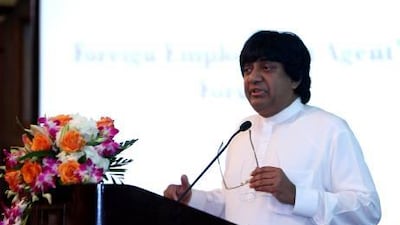DUBAI // Tighter emigration regulations will be passed to discourage women from leaving Sri Lanka to work overseas as housemaids.
The Sri Lankan minister for foreign employment promotion and welfare made the announcement in Dubai yesterday, saying the island nation wanted to boost opportunities for professional and skilled workers instead.
Dilan Perera said his government's new focus on the skilled sector was part of a plan to change perceptions about the country as well as recurring complaints of harassment by housemaids.
___________
Also
• Sri Lanka examines 'nail abuse' of maid
• Maid with 24 nails in her body claims torture by Saudi employer
• Sri Lanka blacklists agent who recruited tortured maid
• Saudi Arabia death row maid in a fight for her life
___________
"I'm not saying I'm banning housemaids from migrating, but I will regulate more," said Mr Perera, speaking on the sidelines of an employment seminar in Dubai.
Two months ago, Sri Lanka raised the minimum age for housemaid jobs overseas from 18 to 21 years. Mr Perera said he planned to further raise the age limit and hike pay scales from Dh825 per month by helping these women improve their job grade to housekeeper.
There are an estimated 250,000 Sri Lankans employed in the UAE and 11,285 Sri Lankan housemaids arrived here last year to work.
Mr Perera headed a delegation of government and recruitment officials on a five-day visit to the UAE. The team arrived here last week from Doha, Qatar and will head to Dammam, Saudi Arabia next week.
"I want to discourage the housemaid category and explore more opportunities in the skilled, semi-skilled and professional category. This is because there are more problems in the housemaid category," he said.
Mr Perera described the UAE as the country with the lowest complaints about housemaid harassment in the Middle East, with about 40 complaints registered per month.
"The number is 10 times more in other Middle Eastern countries," he said, a day after visiting a Dubai safe house that is home to 38 maids who fled their employers. "I'm not saying there are no problems here; there are, but it's much lower. These women are not slaves and must be treated with respect."
Five maids in the safe house said they had been beaten by employers and recruitment agents when they asked to return home. The remaining women had taken refuge due to illness or because they wished to return to their family. The consulate has plans for a bigger safe house that will offer specialised counselling.
Sri Lankans in the UAE greeted news of increased government regulation with a mixed response.
"I'm wary of regulation, it creates delays, frustrates workers and employers," said a Sri Lankan businessman, who asked to be identified as Roshan. "How can you dissuade poorer women from going abroad when their families need the money?"
Sahada B, a Sri Lankan housemaid, supported the age revision, but objected to further changes.
"Young girls get sad for home quickly, so for very young girls it is not a good idea," said Sahada, 28, who has worked in Dubai for four years. "But we come to make a good life for our family, so it is not good to stop us."
The emotional toll on families when young mothers left Sri Lanka for housemaid jobs was another reason the government hoped to discourage women from working in low-paying positions abroad. Counselling centres for children whose mothers work abroad and scholarships for offsprings of migrant workers have been announced.
"We are trying to fill the vacuum that opens up when their mother or father is away," Mr Perera said. "It has a big impact on young children, especially when their mothers are away."
A week-long exit training course for all workers heading to the Middle East will be lengthened to 21 days. This programme includes tips on cleanliness, childcare, first aid and basic language skills in English, Arabic and Hindi.
Sri Lanka will also streamline processes by monitoring and grading recruitment agencies for easier selection, blacklist poorly performing companies and absconding employees who head off on holiday and do not return to the UAE.


